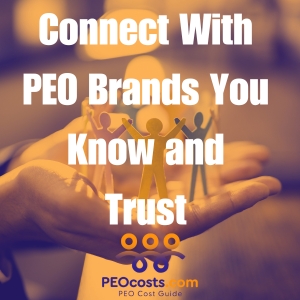What is PEO and What It Does For Businesses?
If you’re a business owner considering ways to streamline your HR processes, you may have come across the term PEO. But what exactly is a PEO, and how can it benefit your business? In this blog post, we will break down what a PEO is, how it differs from traditional HR functions, and the key advantages and disadvantages. We’ll also cover the common services offered by PEOs and what you can expect in terms of cost.
What Does PEO Stand For?
PEO stands for Professional Employer Organization. A PEO is a firm that provides comprehensive HR services to small and medium-sized businesses. Through a co-employment model, a PEO takes on many of the responsibilities associated with employment, allowing business owners to focus on growing their business rather than getting bogged down with HR tasks.
What is a PEO?
A PEO partners with a business to manage and streamline HR-related functions. This co-employment relationship means that both the business and the PEO share employment responsibilities. While the business owner continues to manage day-to-day operations and work closely with employees, the PEO handles tasks such as payroll, benefits administration, compliance, and workers’ compensation.
Difference Between HR and PEO
It’s important to understand how a PEO differs from traditional in-house HR departments. An HR department operates within the business, managing internal employee relations, recruitment, and administrative tasks. A PEO, on the other hand, offers outsourced HR services, taking over these tasks externally while allowing the business owner to remain the primary point of contact for leadership and management.
HR Departments typically focus on employee engagement, conflict resolution, and talent acquisition, while a PEO focuses more on administrative functions like benefits, compliance, and payroll. This can be especially valuable for small businesses that may not have the resources to maintain a dedicated HR team.
Advantages of a PEO
PEOs offer several key benefits for businesses, particularly smaller ones that need access to enterprise-level resources without the hefty price tag.
- Cost Savings: By pooling employees from multiple businesses, PEOs can provide access to affordable, high-quality benefits, including health insurance, retirement plans, and more.
- Compliance: Staying compliant with labor laws, tax regulations, and other HR requirements can be overwhelming. PEOs help businesses stay compliant with federal, state, and local regulations, reducing the risk of costly fines and legal issues.
- Time Savings: Outsourcing HR tasks to a PEO frees up valuable time for business owners and managers to focus on their core operations rather than dealing with HR paperwork.
- Employee Benefits: PEOs can offer employees access to better benefits packages, often at lower costs than if the business were to secure benefits on its own.
- Improved Recruiting: Many PEOs provide recruitment assistance, helping businesses attract and retain top talent.

Disadvantages of a PEO
While PEOs offer many advantages, they aren’t the right solution for every business. Some potential downsides include:
- Loss of Control: Some business owners may feel that outsourcing HR functions leads to a loss of control over their workforce management.
- Cost: For very small businesses, the costs of a PEO may not justify the benefits, particularly if the business doesn’t need all the services offered.
- Not a One-Size-Fits-All Solution: PEOs may provide standardized solutions that don’t always align perfectly with a business’s unique needs or company culture.
Common Services Offered by a PEO
A PEO typically provides a wide range of services that can cover nearly all aspects of HR management. These include:
- Payroll Processing: Managing payroll, tax withholdings, and deductions.
- Employee Benefits Administration: Offering health insurance, retirement plans, and other benefits.
- Workers’ Compensation: Handling claims and insurance.
- Regulatory Compliance: Ensuring the business complies with employment laws and regulations.
- Risk Management: Assisting with workplace safety and legal compliance to avoid lawsuits.
- HR Support: Providing HR advice, drafting employee handbooks, and offering training resources.
- Recruitment Assistance: Helping businesses attract and hire new employees.
How Much Does a PEO Cost?
PEO costs typically fall into two categories: a flat fee per employee or a percentage of total payroll.
- Flat Fee: Some PEOs charge a flat monthly fee, usually ranging from $100 to $150 per employee.
- Percentage of Payroll: Other PEOs charge based on a percentage of your company’s gross payroll, typically ranging from 2% to 6%.
The exact cost depends on the services included, the size of your business, and the PEO provider you choose. While these fees may seem significant, many businesses find that the savings on benefits, time, and compliance offset the PEO’s fees.
A PEO can be a game-changer for small and medium-sized businesses that need help managing HR, benefits, and compliance. By partnering with a PEO, business owners can reduce administrative burdens, lower costs, and access better employee benefits, allowing them to focus on growing their business. However, it’s important to weigh the advantages and disadvantages and determine whether a PEO aligns with your business’s specific needs.
If you’re considering a PEO for your business, PEOcosts.com can help you evaluate your options and choose the right provider based on your specific requirements.
The 5 Types of PEO Services
There are different types of PEOs, each offering various services tailored to the specific needs of businesses. Understanding the distinctions can help you decide which type best suits your company’s needs. Here are the main types of PEOs:
- Full-Service PEO: This type of PEO offers a comprehensive suite of services, including payroll management, benefits administration, regulatory compliance, risk management, and HR support. It’s ideal for businesses looking to outsource most, if not all, of their HR functions.
- Administrative Services Organization (ASO): Unlike a full-service PEO, an ASO doesn’t establish a co-employment relationship. It focuses on providing administrative support such as payroll processing and benefits administration, while the business retains full control over HR decision-making.
- HR Outsourcing (HRO): This type of PEO is often chosen by businesses that want to outsource only specific HR tasks, such as recruitment or training. HROs are flexible and allow companies to retain more control over their internal HR while outsourcing select functions.
- Payroll Companies: Some companies only provide payroll and tax compliance services. These organizations aren’t technically PEOs but offer essential services often included in full-service PEO agreements. They are best for businesses needing simple payroll assistance without comprehensive HR outsourcing.
- Specialized PEOs: These are niche providers that focus on specific industries or HR functions. For example, a specialized PEO may cater to healthcare organizations or tech companies, offering services tailored to the unique challenges in those sectors.

5 Frequently Asked Questions (FAQs) About PEOs
By understanding the different types of PEOs and how they can assist businesses, as well as knowing the answers to common questions, you’ll be better equipped to decide if a PEO is the right solution for your business needs.


